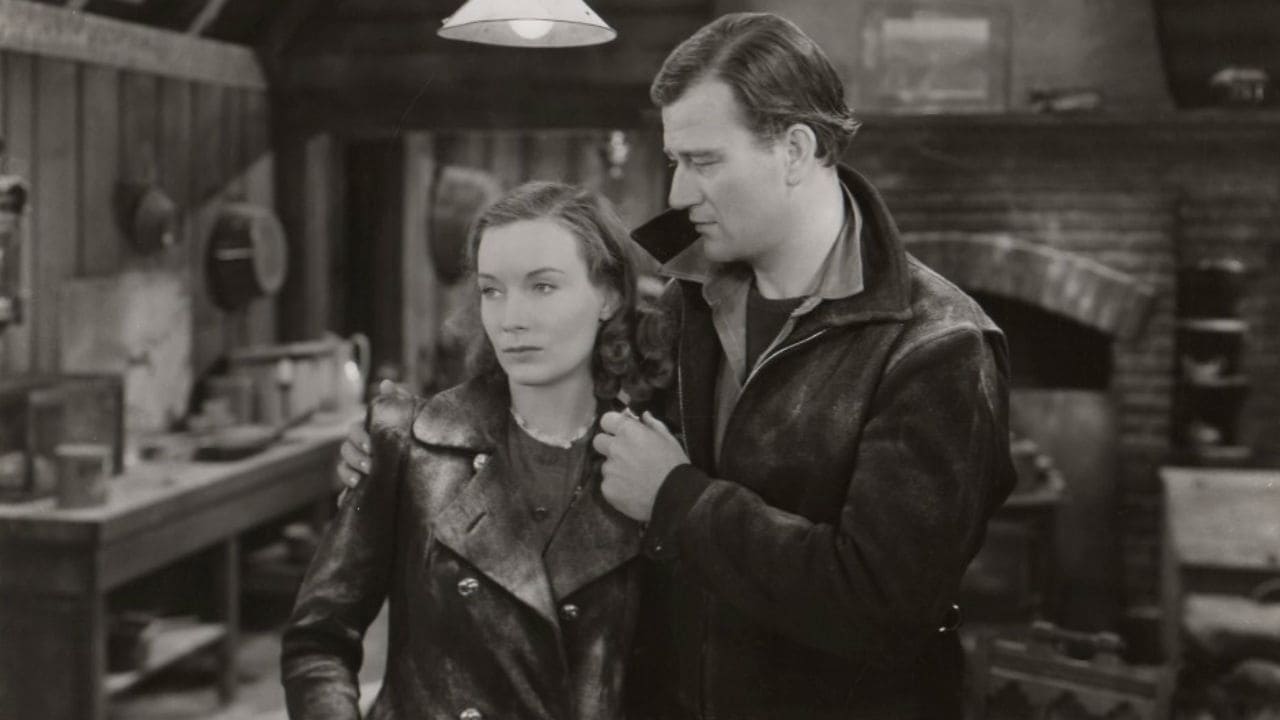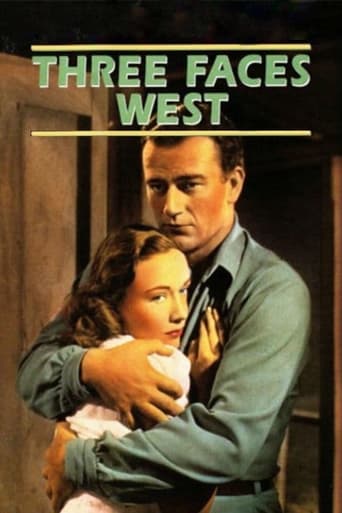

Lack of good storyline.
... View MoreThe performances transcend the film's tropes, grounding it in characters that feel more complete than this subgenre often produces.
... View MoreIt's hard to see any effort in the film. There's no comedy to speak of, no real drama and, worst of all.
... View MoreThis is a coming of age storyline that you've seen in one form or another for decades. It takes a truly unique voice to make yet another one worth watching.
... View MoreTaking part in a poll on ICM for the best movies of 1940,I started looking for movies which came out that year. Solely knowing John Ford's magnificent The Long Voyage Home as the only thing he starred in this year,I was intrigued to find out that John Wayne had done another movie in 1940 which sounded like it deals with the same themes Ford touched on in 1940's The Grapes of Wrath,which led to me facing west.The plot:Emigrating to the US as the horrors of WWII grip Europe, Dr. Karl Braun and his daughter Leni 'Lenchen' Braun settle in a Dust Bowl farm town in North Dakota. Welcomed by John Phillips,the Braun's learn that the locals are desperate for new farming machines,but are told by the Department of Agriculture that they must keep to the old ways. Believing that there is no hope left in the Dust Bowl,Phillips makes plans with his fellow townspeople to all travel to a new home,as Leni finds out that her fiancé has embraced Nazism.View on the film:Limiting any action to a dirt road chase to the end credits, director Bernard Vorhaus & cinematographer John Alton plant an atmospheric character study,that digs up the lingering effect of the 1929 crash,with dour brown and bronze colours lining the stomach of the town. Displaying a sharp ear for sound,Vorhaus listens in on the towns waiting for FDRs New Deal,via rustling howls and an eerie yowl from the wind signalling the wasteland state of the country. Carving the Nazi fiancé to be the most film-like element,the screenplay by F. Hugh Herbert/Joseph Moncure March and Samuel Ornitz wonderfully keep the drama grounded,from the Braun's getting a mixed reaction to their arrival,to Phillips difficulties leading him to not reach his hopes of being the cowboy who rides during sundown and saves the town. Joined by a fittingly fragile Sigrid Gurie as Leni,The Duke shakes his (big C) conservative image with a striking performance as Phillips,that rings a warm sincerity for the New Deal facing the former Wild West.
... View MoreI feel this movie doesn't get what it deserves. Was an excellent story line. Good acting. Its got everything. Farmers work hard to make it work while being hard hit by the drought and dust storms. Two refugees, a medical doctor and his 20?-year-old daughter arrive in the USA from Nazi-annexed Austria. They eventually are convinced...??? Its got it all. Much more happens and is very exciting. In a small North Dakota farm town. Love it. John Wayne is the man in this movie. This film is not well known and hasn't got the attention as his other films but to me it is one of his best and maybe his best Drama film in the 40's. Get this one you wont be disappointed.
... View MoreThree Faces West presents two stories, that of a highly respected elderly Austrian doctor (Charles Coburn) and his daughter (Sigrid Gurie) who have fled the Nazi regime and come to American seeking a place to practice medicine, and also that of a small dust-bowl town in North Dakota in need of a doctor which is personified by John Phillips (John Wayne) who is a farmer and community leader. Initially the doctor and more particularly the daughter are not prepared for the hardships they find and wish to leave but a growing romantic relationship brings everyone closer together. A story like this wouldn't be complete without some more obstacles, and in keeping with the two part tale we have two obstacles one for the budding romance and one for the struggling town.The film is definitely very much about the message and it essentially has two messages to deliver, there is the message about tyranny and the sacrifices that may be necessary by those who oppose it and also that of the community and working together to overcome adversity. In light of the era that this was made it is not surprising to see such an approach. It is interesting from an historical point of view to observe the attitudes towards Nazi Germany in the United States of 1940 before they had entered the war.Beyond the good performances from the three principles as well as Spencer Charters in the side kick role there is nothing particularly impressive about the production, but a well intentioned story coupled with an atypical role for Wayne and the interesting historical perspective on both the dust bowl and early years of WWII make this worthwhile viewing for me. It's interesting to note that Sigrid Gurie despite a solid performance would barely make a dozen films over her career. On the other hand Charles Coburn who played her father wouldn't make his first film until he was 56 and continued into his eighties, he also won and Oscar and was nominated for two more.
... View MoreWell, if this isn't one of the more unusual films for John Wayne, I don't know what is! The film begins with a radio program in America where the host is encouraging small American towns to sort of 'adopt' doctors displaced by the war in Europe. While the US would not enter the war officially until almost 1942, this film had a very anti-Nazi tone--something new to Hollywood films.One of the doctors is Charles Coburn who plays an Austrian (!) and he has a daughter who is a nurse (Sigrid Gurie). They are offered a job in North Dakota and when they arrive they find that it is nothing but dust and misery. The two want to leave immediately, but the townspeople need them so much that they agree to stay. However, in the meantime two important things happen. First, the dust problem becomes so severe that the town decides to relocate to Oregon. Second, Sigrid falls in love with John Wayne. While her love for Wayne is no surprise, their impending marriage is scuttled when they learn that her long-dead fiancé is actually alive and coming to America. It seems that the Nazis didn't kill him after all. So we are facing two dilemmas. How to get everyone in town to move en masse to Oregon (especially when there are a couple hot-heads in the group) and how will Wayne and Gurie be able to marry? Tune in and see.I liked this film a lot more than I expected--much of it because of the historical aspects of it. Other than THE GRAPES OF WRATH and IT'S A GIFT (to a lesser extent), I can't think of any films that talked about the dust bowl years. And it was nice, also, because THE GRAPES OF WRATH offer a view that is a bit biased--as Steinbeck was trying to make more of a political statement in his writings (so the true historical nature of the Joads are sensationalized quite a bit). Here, it's a more optimistic view of this upheaval. Additionally, it was a nice change of pace for Wayne--who before this had done mostly Westerns. Overall, a surprisingly good film.PS--In a rather poorly done scene, a US Department of Agriculture representative is talking to Wayne and he points to the map where supposedly Wayne's town in North Dakota is located. The pointer actually appears to be about 1000 miles off!!
... View More